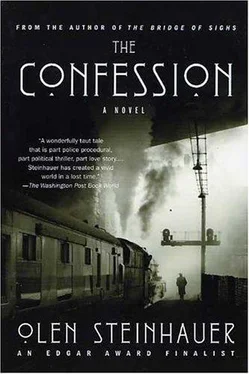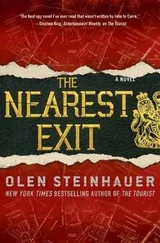Olen Steinhauer - The confession
Здесь есть возможность читать онлайн «Olen Steinhauer - The confession» весь текст электронной книги совершенно бесплатно (целиком полную версию без сокращений). В некоторых случаях можно слушать аудио, скачать через торрент в формате fb2 и присутствует краткое содержание. Жанр: Политический детектив, на английском языке. Описание произведения, (предисловие) а так же отзывы посетителей доступны на портале библиотеки ЛибКат.
- Название:The confession
- Автор:
- Жанр:
- Год:неизвестен
- ISBN:нет данных
- Рейтинг книги:5 / 5. Голосов: 1
-
Избранное:Добавить в избранное
- Отзывы:
-
Ваша оценка:
- 100
- 1
- 2
- 3
- 4
- 5
The confession: краткое содержание, описание и аннотация
Предлагаем к чтению аннотацию, описание, краткое содержание или предисловие (зависит от того, что написал сам автор книги «The confession»). Если вы не нашли необходимую информацию о книге — напишите в комментариях, мы постараемся отыскать её.
The confession — читать онлайн бесплатно полную книгу (весь текст) целиком
Ниже представлен текст книги, разбитый по страницам. Система сохранения места последней прочитанной страницы, позволяет с удобством читать онлайн бесплатно книгу «The confession», без необходимости каждый раз заново искать на чём Вы остановились. Поставьте закладку, и сможете в любой момент перейти на страницу, на которой закончили чтение.
Интервал:
Закладка:
Georgi Radevych was known as a drunk and, briefly, as the author of a small volume of state-published poetry that made his name. He had used that momentary fame to secure his position as an arbitrator of all things literary. He gathered writers in his home and made them perform for him, and sometimes from these evenings self-published manuscripts emerged that bore his name on the front page. After my own little book came out, he showed up at the Militia station and introduced himself. I couldn’t help but admire that. He had a card with the profession poet inscribed in cursive beneath his name. He invited me to his evenings, and over the last four years I had met almost everyone who did any worthwhile writing in the Capital, before forgetting their names. They came through his apartment, drank his wine, and performed impromptu readings under the gaze of his bearded Stalin. Even I got into the mood now and then and said some spontaneous lines, but those were rare intoxicated moments, and seldom worth a listen.
Georgi flopped into a chair and asked how the criminal classes were coming along. I told him about the dead man in the kitchen. He waved his red hands. “This is what passes for criminality these days?”
“Suicide’s illegal.”
“A sin, you mean. Just a sin. And a coward’s way of breaking the law. You’ve got to stay alive in order to face the punishment. Tell me, Ferenc,” he said, dropping to almost a whisper, “what have you got for my new collection?”
He had been asking for months. They were going to put out another volume of writings, dissident writings perhaps, on the theme of responsibility. He wanted a piece from everyone. Another basement-printed book-maybe just some stapled pages to pass around to friends and talk over in smoky living rooms like this one. “I don’t have anything.”
“Weren’t you writing in the provinces?”
“I was trying to restart my marriage.”
“And?”
I drank the wine, but it had a spoiled edge. I set it on an end table. Somebody in the kitchen turned on the radio, and we heard static until voices rose through it. It was the American station that you could sometimes hear from Germany, broadcasting eastward. In certain weather it drifted through. News and music and more news. Georgi’s eyes closed as he meditated on the commentary on developments in Poland: negotiations between Moscow and Warsaw to end the unrest. “The Frenchman, he’s staying here?”
He nodded, eyes still shut. “Been here two weeks. But tomorrow it’s off to Prague, and then back home to Paris. A glorious tour of the People’s Republics.”
“There was no trouble, then? Him staying here? No knocks on the door?”
Georgi opened his eyes, then his hands, and spoke with the simplicity of spirit that reminded me that I actually liked him. “We’re living in the most wonderful of times, my friend. And if we’re not, then please, don’t let me know.”
12
“I’ll tell you what I’m trying to do,” said the Frenchman. He had come in after Georgi left and leaned forward on the edge of the chair. “I’m trying to grasp this situation we’re in right now. It’s unprecedented, you know, in human history. The entire planet is split between two camps, and the rest of us are intermediaries. We’re the ones fighting it out. I want to find a way to express this puppetry. Because that’s what we are. We’re puppets of history, and we’re playing out a tragedy. Those hydrogen bombs are ready to be dropped. There are enough idiots in the White House and the Central Committee to ensure one of those buttons is going to be pressed. And the longer the wait, the bigger the explosions-they’ll put bombs into space before long. I’m not kidding, all our leaders are mad. In the West we vote them in, but the vanity only makes them more crazy. Don’t you see? All our efforts are toward our own annihilation.”
He was drunk, but this was something he’d thought about for a long time and needed no sobriety to express-just a listener.
“Now, I’m not trying to deride this situation. I’ll leave that to the pacifists. It simply is, and I want to see it as clearly as I can. Without prejudice.”
“So what’s this?” I asked. “Your visit here. Research?”
He crossed a leg over his knee with some effort, then gripped his raised ankle. “Yes, maybe, in part. But I’ve spent a lot of time here over the years, and I always have friends to see. A very special one recently got out of the camps, thank God. This soil is in my heart,” he said, touching his nose. “You should see the miles of paperwork I had to fill out in order to come here. Then the checks at the border, the soldiers who went through my luggage. They kept half the gifts I brought! I’ll never see them again.” He frowned. “You probably don’t see it in the newspaper, but the East Berliners are running through the border like mad. Nobody can stop them. There’s not enough room in the refugee camps.”
“They just pick up and leave their homes?”
“They’re desperate, Ferenc.” He leaned closer. “You know what happens when I walk down the streets here? People follow me.”
“State security?”
“No- investors. They want to buy French francs. They can smell it on me.” He paused. “And do you know, Comrade, what Western money smells like?”
I shook my head.
“Soap,” he said. “It’s the smell of a clean body washed with Western deodorant soap.”
I settled back, remembering the excuse for a bath I’d put myself through that morning, in the sink, and all those weeks in the dacha. “You’re not a communist after all.”
He smiled. “I’m a communist all right. I just haven’t seen an ounce of real communism since crossing the Iron Curtain.”
There was commotion in the kitchen; someone had won a hand. But it was a weak enthusiasm. They were getting tired.
“Georgi tells me you’re having trouble writing,” he said.
I was surprised Georgi considered it important enough to mention. “It’s just not coming.”
“But no ideas? Nothing at all?”
“A couple things, maybe.”
He gave a fatigued smile. “You’ve heard, though, haven’t you, that plot is dead?
“Is it?”
“I read it in l’Humanite, some editorial. Plot is a capitalist construct made to give lives a false sense of totality, so they can be valued like a wheel of Brie, then bought and sold.” He grinned. “Luckily, I’m a poet. It doesn’t affect me.”
Vera and Karel appeared, and when she kissed my cheeks, I thought I heard her whisper, Call me, but wasn’t sure. When she pulled away she smiled conspiratorially. Karel shook my hand. The others gave quiet greetings on their ways out, and I knew then that Georgi had told them all about Magda and me. I was too tired to be bothered by it. They filed by the sofa, asking why they never saw me these days, telling me to give them calls. Their requests for a call were entirely different from Vera’s. They told Louis they would see him again, and, with an elegant bow, he said that this was undoubtedly true. And then, after what seemed like forever, they were gone. Georgi settled on the other corner of the sofa, and the three of us were silent for a while. Georgi laughed once, but when we looked at him he shook his head.
“Alors,” said Louis. He leaned into a standing position.
Georgi stood as well. “Staying?”
I shrugged.
“Tomorrow, then.”
Once they were in their rooms, I got another glass of wine, lit a cigarette, and stretched out on the sofa. Vera was behind my lids. Almost a year before, at a Christmas gathering, on that same sofa, she lay on top of me and kissed me deeply. I could feel the weight of her slight body, her narrow hips, her small breasts against me. It was a wonderful kiss; I hadn’t had one like that from Magda in a long time. Ever since then she had watched me when we were all together, and it had taken a long time to rid her stare of the heat that spread along my neck and cheeks. Now, though, her suspicions about Magda’s and my problems had been verified. I rolled over.
Читать дальшеИнтервал:
Закладка:
Похожие книги на «The confession»
Представляем Вашему вниманию похожие книги на «The confession» списком для выбора. Мы отобрали схожую по названию и смыслу литературу в надежде предоставить читателям больше вариантов отыскать новые, интересные, ещё непрочитанные произведения.
Обсуждение, отзывы о книге «The confession» и просто собственные мнения читателей. Оставьте ваши комментарии, напишите, что Вы думаете о произведении, его смысле или главных героях. Укажите что конкретно понравилось, а что нет, и почему Вы так считаете.












